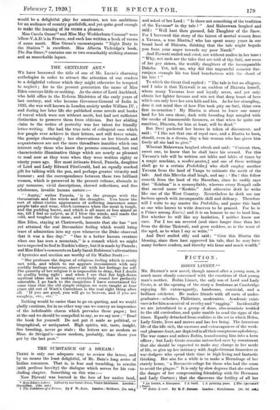THE GENTLEST ART.*
WE have borrowed the title of one of Mr. Lucas's charming anthologies in order to attract the attention of our readers to a delightful volume which they might otherwise be tempted to neglect ; for to the present generation the name of Miss Eden conveys little or nothing. As the sister of Lord Auckland, who held office in the Reform Ministries of the early years of last century, and who became Governor-General of India in 1835, she was well known in London society under William IV. ; and during her later life she published some novels and books of travel which were not without merit, but had not sufficient distinction to preserve them from oblivion. But her abiding claim to the notice of posterity was her talent for friendly letter-writing. She had the true note of colloquial ease which few people ever achieve in their letters, and still fewer retain. She gossips charmingly ; her observations on her friends and acquaintances are not the mere threadbare inanities which can interest only those who know the persons concerned, but real characteristic illuminative things which are nearly as pleasant to read now as they were when they were written eighty or ninety years ago. Her most intimate friend, Pamela, daughter of Lord and Lady Edward FitzGerald, had an equally marked gift for talking with the pen, and perhaps greater vivacity and humour ; and the correspondence between these two brilliant women, which is preserved in the present volume, abounds in gay nonsense, vivid descriptions, shrewd reflections, and fine wholesome, lovable human nature :- "'Aunty,' writes Pamela, is in the grumps with the rheumatism and the winds and the draughts. You know the sort of silent-victim appearance of suffering innocence some people take and wear, which increases when the meat is tough, and the pudding burnt, and which is all more or less aimed at me, till I feel so culprit, as if I blew the winds, and made the cold, and toughed the meat, and burnt the dish.' " Miss Eden, staying at Chatsworth, laments that she has " not yet attained the real Devonshire feeling which would bring tears of admiration into my eyes whenever the Duke observed that it was a fine day." " One is a better human creature when one has seen a mountain," is a remark which we might have expected to find in Ruskin's diary, but it is made by Pamela ; and Miss Eden's comments on Lady Sarah Robinson's alternations of hysterics and unction are worthy of Sir Walter Scott:— "She professes the degree of religious feeling which is rarely met with, and which to me appears inconsistent with any worldly feelings whatever, above all with her feelings for self. The quantity of her religion it is impossible to deny, but I doubt its quality being right ; and when I see that her high-flown mystical ideas end in making everybody round her perfectly miserable, I go back to the suspicions I have entertained for some time that the old simple religion we were taught at four years old out of Watt's Catechism is the real right thing after all. ' If you are good, you will go to heaven, and if you are naughty, etc., etc.' "
Nothing would be easier than to go on quoting, and we would gladly continue, for in no other way can we convey an impression of the indefinable charm which pervades these pages ; but at the end we should be compelled to say, as we say now : " Read the book for yourself. Do not put it aside as political, or biographical, or antiquated. High spirits, wit, taste, insight, fine breeding, never go stale ; the letters are as modern as Mme. de Sevigne's—more modern, probably, than those you got by the last post."






































 Previous page
Previous page